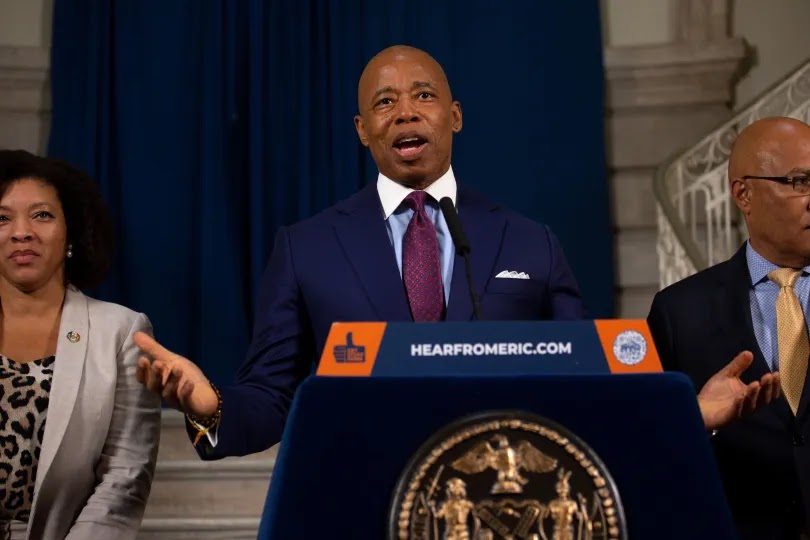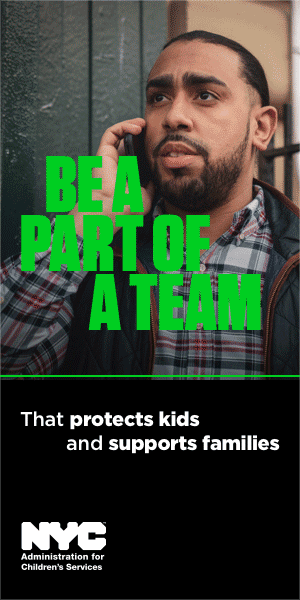State Budget’s Biggest Winner May Be Mayor Eric Adams
By Greg David and Greg B. Smith, The City
This article was originally published on by THE CITY
NEW YORK - The “conceptual” budget deal announced Thursday by Gov. Kathy Hochul represents a defeat for progressive legislators and their allies on the minimum wage and tax hikes — and a big win for Mayor Eric Adams as he negotiates his own budget with the City Council.
One stakeholder that could claim at least partial victory is NYCHA, the struggling agency that spent weeks begging the state for pandemic-related emergency rent relief that had been denied to public housing tenants. Hochul promised $391 million for public housing statewide, though she did not say how much would go to NYCHA.
The governor’s announcement also left budget watchdogs fuming over the lack of detail, making it impossible to figure out how much the state is increasing spending and what kinds of deficits it will face in the future.
The Legislature is expected to return to Albany early next week to vote on the budget and more details may become clear then. But the governor said spending would total $229 billion, which is about a 3% increase in state operating funds from last year.
“It supports our bold vision for the future without spending beyond our means,” Hochul said in remarks outlining the deal. She also said the money the state had set aside in reserves would reach 15% of the budget, but didn’t specify an amount.
She and legislative leaders agreed on a modest increase in the minimum wage, a pact that outraged progressive legislators who had demanded more. Under the deal, the minimum wage in the city and adjacent suburban counties will increase by $2 in the next three years to $17 an hour and then be indexed to inflation as measured by the consumer price index.
The minimum wage was raised to $15 in the city at the end of 2018, but since then inflation has eroded its value by 29%, according to calculations by New School economist James Parrott.
“If this anemic proposal is enacted, the governor will have succeeded in making New York City a second tier city for working people,” he said. By comparison, he added the 2026 minimum wage in Seattle will be nearly $21, more than $20 an hour in San Francisco, and around $19 in Washington, D.C., and Los Angeles.
Efforts to increase taxes on wealthy New Yorkers also failed to make it into the budget. The only tax increases approved are a three-year extension of an increase in the corporate tax rate, as proposed by Hochul, and an increase in the MTA’s payroll tax to 0.6% for city-based employers with payrolls over $1.7 million.
“Rather than raise sustainable new revenue through taxes on profitable corporations and high earners, this budget leaves critical funding on the table that could be used to expand child care, invest in higher education, protect tenants, and close the MTA’s operating deficit,” said Nathan Gusdorf, executive director of the Fiscal Policy Institute.
The issue of higher taxes is certain to dominate future budget negotiations. Gusdorf noted that the state will lose billions of dollars in revenue when temporary increases in corporate and personal income tax rates for people making more than $1 million expire in future years.
Suburban legislators who were crucial in killing Hochul’s ambitious housing program were also able to prevent the payroll tax being raised on businesses they represent.
MTA Aid
Still, Adams clearly emerged as a big winner in the deal. He won about $1 billion to help with the costs of asylum seekers. The city will contribute an extra $165 million to solve the MTA budget crisis rather than $500 million Hochul had originally demanded, and the city will receive more school aid than expected.
“The conceptual budget framework announced by Governor Hochul last night reflected some major victories for working New Yorkers achieved as a result of our advocacy,” the mayor said in a statement.
The MTA bailout is based on $1.1 billion from the payroll tax increase, $300 million in one-time aid from the state, an additional $165 million from the city and some revenue from the big fees new casinos will pay for licenses. It isn’t clear if the money will be sufficient long term to avoid severe service cuts or sharply higher fares if ridership continues to lag pre-pandemic levels.
Still, MTA CEO Janno Lieber reacted with praise for Hochul: “This is a huge milestone for MTA riders and I’m not going to stop saying it: Thank you, Governor,” he said Friday.
“We have certainty for MTA riders that the system is going to continue to function. Not only are we going to continue the same service we have been having, we’re going to get more service — we’re going to get more night service, we’re going to get more weekend service because of the budget.”
The announcement by the governor did not provide any detail on where spending is being increased outside of education, what the state expects its revenues to be given growing fears the nation is headed to a recession, or the size of the deficits the state is projecting in future years.
“This is like almost blind people who can see parts of an elephant but no one knows if it is going to stomp on their heads,” said Andrew Rein, president of the Citizens Budget Commission fiscal watchdog group.
The other major changes in the budget which were agreed upon earlier include:
Bail reform: Judges are to get more discretion to consider public safety when considering whether to hold people in jail. Efforts to weaken new struct rules on providing discovery evidence to defendant’s lawyers collapsed at the end.
Charter school expansion in the city. Hochul had wanted to allow more than 100 new charter schools but she settled for 14 new charters for the city, which will be allowed by reauthorizing so-called zombie charters taken from schools that had shut down.
No tuition hikes at CUNY for in-state students as the governor had proposed.
Another escape for Madison Square Garden, which will be able to keep a property tax exemption that had been targeted by its many critics.
A big win for environmentalists as New York will become the first state to ban new natural gas hook-ups in small buildings beginning in 2025 and large buildings beginning in 2028. However, no details were provided and some supporters worry that exemptions will be allowed.
NYCHA Relief
For NYCHA, the nation’s biggest housing authority, Hochul’s budget offered some relief for a massive budget gap caused by the thousands of tenants who stopped paying rent during the pandemic.
In her budget announcement Thursday, the governor included $391 million in rental assistance funds for public housing statewide. She did not spell out how much of that will go to NYCHA, which with 400,000 tenants is by far the largest such authority in the state.
When the pandemic struck in 2020, Albany worked out an Emergency Rental Assistance Program (ERAP) to help tenants make rent, but those receiving any form of rent subsidy — including NYCHA tenants — were put at the back of the line behind traditional private-sector renters.
Predictably, the ERAP funds paid to private-sector landlords tapped out the fund before a penny could go to support public housing rent. Also not surprisingly NYCHA experienced a massive drop off in rent payments, racking up $466 million in rent arrears as of last month.
The gap was so bad NYCHA management warned they would cut back on some development upgrades and would likely miss deadlines going forward on building renovations mandated by a 2019 agreement with the federal government to fix up tens of thousands of aging apartments.
For weeks NYCHA and legislators such Assemblymember Linda Rosenthal (D-Manhattan), and state Sen. Brian Kavanagh (D-Manhattan, Brooklyn), both housing committee chairs, pushed Hochul to give public housing tenants the same benefits private renters had received.
The Senate and Assembly’s proposed budgets included around $385 million for this purpose, most of which was to go to NYCHA. But sources have told THE CITY that at the moment, Hochul’s budget includes only $150 million for NYCHA, subsidizing the rent of only those tenants who’d applied for ERAP during the pandemic. Thousands more did not apply but still fell behind in their rent.
Updated April 28 at 3:40 p.m. to add reaction from MTA CEO Janno Lieber.
THE CITY is an independent, nonprofit news outlet dedicated to hard-hitting reporting that serves the people of New York.













Comments
Post a Comment